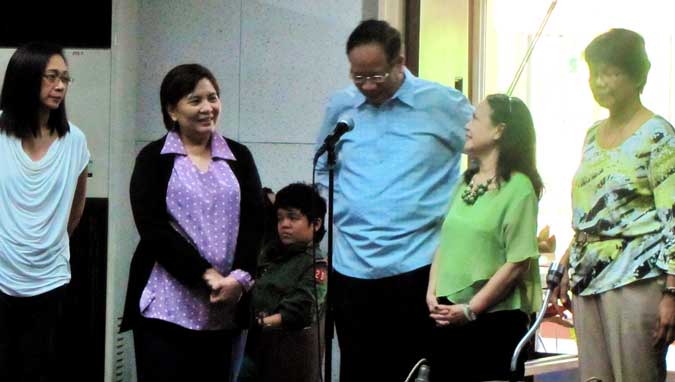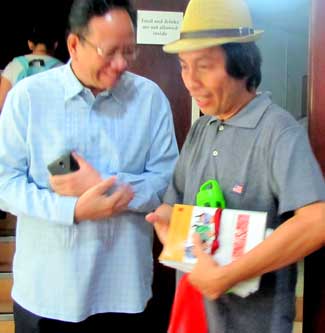Fighting corruption is like waging war
Contributed by Roseann Jonamae Nunag Rodriguez
CenPEG
The Art of Fighting Corruption: Korapsyonaryo and confronting the enemy through knowing him.
.jpg)
Folk dance. CenPEG photo
“If you know yourself but not the enemy, for every victory gained you will also suffer a defeat,” the ancient Chinese military strategist Sun Tzu wrote in the world-renowned text The Art of War, one of the most influential references on military strategy and war tactics. Its applicability, however, does not end in traditional wars – the act of fighting against a deeply-entrenched but undesirable system, such as corruption, is also a war in itself.
The importance of knowing the enemy is embodied in Korapsyonaryo: Bokabularyo ng Korapsiyon at Lipunan, a book dedicated to identifying and defining folk words used as terms relating to corruption. As a project headed by the Center for People Empowerment in Governance (CenPEG), the book aims to arm the ordinary people with sufficient knowledge on corruption in order to empower them to stand up and fight against it.
In 2008, CenPEG launched Corruptionary, a book that features Tagalog and English words. Corruptionary, a book conceptualized by CenPEG Executive Director Evita L. Jimenez, is the only dictionary of corruption words in the world. The book was also re-launched during the International Anti-Corruption Conference (IACC) in Athens in 2009. At the moment, Korapsyonaryo is the only collection dedicated to establishing the connection between folk culture, particularly the language aspect, and corruption.
To introduce the second volume of Corruptionary - Korapsiyonaryo: Walang Kukurap sa Sining-Lunsad - a cultural event featuring dance, art, and poetry, was held on June 19, 2015 at the University of the Philippines’ Faculty Center, Diliman, Quezon City. The cultural event was organized by the Aliguyon-UP Folklorist, CenPEG, and other groups in cooperation with the Office of the UP President and the National Commission on Culture and the Arts (NCCA). (This writer was also there along other UP Manila political science majors to assist in the performances.)
At the start of the event, three special guests were each asked to smash a palayok (clay pot) which had a copy of the book inside as a symbolism to fighting corruption. This and the other performances were accompanied by explanations from Prof. Melecio Fabros III who, aside from being the event’s coordinator, was also head of folk culture organization, Aliguyon-UP Folklorist.
After one performance, Fabros noted that “the mere existence of words in folk language being used especially for corruption is a reflection of the depth of the problem of corruption.” It is so well-embedded in our culture that it has become a part of something as routine as our vocabulary. The event used cultural presentations to counter what was assessed as an unnatural sub-culture; the event thus seems to act as a sort of counter-culture to corruption.
For instance, Dallot, an Ilokano wedding dance, was performed to represent the persistence of the culture of corruption. The couple was brought together by both being corrupt individuals and they stayed the same even after the first transaction, or the wedding, ended – a symbol of how corruption is not done on a case-to-case basis, but is rather something that is continued for a long time and across generations.
Corruption, however, is not the main problem; it is only a manifestation of something that is bigger and more complicated. Although we are made to believe that Filipinos are corrupt by nature, a quick glance at history would prove otherwise. Like globalization and other woes of our time, it was brought to us by a system of society that puts primacy not to the people but to wealth and power. Thus corruption is one of the manifestations of this rotten system that exists till today.
It is true that the war does not end with obtaining knowledge about the enemy, but it is helpful machinery that increases the chance of victory. As Sun Tzu continues, “If you know the enemy and know yourself, you need not fear the result of a hundred battles.” With Korapsyonaryo, we are one step closer to the better world that we long for.

UP Vice President Maragtas Amante (center), flanked by CSSP Dean Grace Aguiling-Dalisay, college officials, and Executive Director Evi Jimenez (right). CenPEG photo

Event organizer Prof. George Fabros with VP Amante (CenPEG photo)
.jpg)
Native folk singer (CenPEG photo)
.jpg)
CenPEG’s Evi Jimenez delivers message (CenPEG photo)
.jpg)
Another folk dance with student performers (CenPEG photo)
.jpg)
Participative cultural event (CenPEG photo)
- Probing presidential platforms
- Conference calls for people-centered policy actions for Asian development and peace
- WWII 'comfort women' urge visiting Japanese emperor: OFFICIAL GOV’T APOLOGY, UPHOLD TRUTH, and JUST COMPENSATION
- FEARLESS FORECAST (EPISODE II): Comelec will not comply with e-Commerce Law in 2016 elections
- Fearless forecast: Comelec’s non-compliance with the AES law in 2016 (last of 2 parts)
- Fearless forecast: Comelec will not comply with the AES law in 2016
- CenPEG releases travelogue
- Experts: Nuisance bets reflect disillusionment, uneven playing field
- Partylist solon presses for tax cuts
- The True Cost of a Political Campaign
- Management decisions: Based on RA 9369 or purely Comelec’s?
- CenPEG holds 1st roundtable with media on presidential poll results
- Filipino IT can do it!
- FIT4E: The only transparent solution
- Realpolitik in the maritime tiff
- China’s challenge to PH sovereignty
- Choosing the next president
- Fixing the presidency, reforming the state
- New Comelec chair says he’s open to other election technologies
- SC ruling on AES Watch Pabillo and IBP vs Comelec, Smartmatic-TIM
- Comelec must explain P3.2B unliquidated cash advances
- CONGRESS ASKED TO HOLD DEMO ON PCOS HACKING
- 25 Bishops ask poll body to stop midnight deal with Smartmatic
- Pope Francis: reform and conversion
- 2 poll watch coalitions stage rally vs Comelec-Smartmatic midnight deal
- AES Watch questions Comelec-Smartmatic midnight deal
- ASEAN-India: Building Youth Partnerships through Culture and Entrepreneurship
- CenPEG forges research exchange and partnership with Jinan University
- FOI: Bearing fruit or foiled again?
- Remittance with Representation: The right to vote of overseas Filipinos
Center for People Empowewrment in Governance (CenPEG), Philippines. All rights reserved


